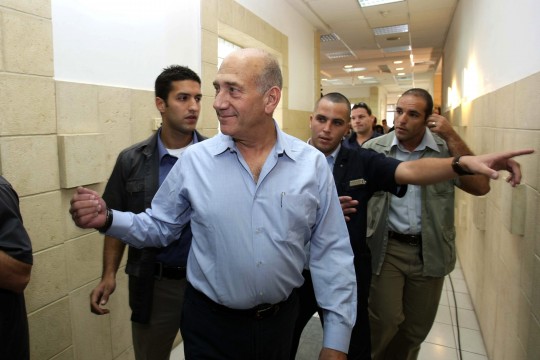JERUSALEM—In 2014, five years after he left office, Ehud Olmert was targeted for assassination by Hezbollah because of an assassination he had approved as prime minister of Israel, according to an Arabic-language newspaper.
The targeting of the out-of-office political leader came as a surprise. In the end, the plan came to naught. The London-based Al-Arabi al-Jadid, citing political elements "in close contact with Hezbollah," said the Lebanese militia was seeking revenge for the killing in 2008 of Imad Mughniyeh, military chief of the organization, by a booby trap placed in his car in Damascus.
Indirect confirmation of the report came Wednesday from sources in Israel, who revealed that security precautions around Olmert were stepped up last year out of concern that Hezbollah would attempt to get at him. Olmert was in office not only at the time of the Mughniyeh killing but during the month-long war between Israel and Hezbollah in 2006.
Although Hezbollah accused the Mossad of the Damascus assassination, the Washington Post revealed two weeks ago that the assassination was a joint operation of the Mossad and CIA. Both organizations have ample reason to target a man responsible for the deaths of hundreds of Americans in Beirut as well as of more than 100 Argentinian Jews and Israeli diplomats.
In a related move last month, Hezbollah arrested one of its senior operatives, Mohammed Shawraba, who was in charge of Hezbollah’s external operations branch.
That job title usually includes assassinations carried out abroad, but from reports in the Arab and Israeli media since his arrest, Shawraba may have spent much of his time preventing assassinations. Hezbollah has reportedly tried multiple times since Mughniyeh’s death to strike Israeli diplomats abroad and other targets, almost always failing.
Shawraba is alleged to have tipped off the Mossad about these plots--at least some of them. There has been only one successful attempt—a bomb that exploded on a tourist bus in Burgos, Bulgaria, in 2012 that killed five Israelis and the local driver. If the Olmert plot is true, then Hezbollah believed that a higher profile victim would be more appropriate payback for Mughniyeh.
According to al-Jazeera, the information provided to the Mossad by Shawraba led to the arrest of Hezbollah operatives in several countries, most recently Peru. Hezbollah leader Hassan Nasrallah last month publicly acknowledged Shawraba’s arrest but said reports of his exploits were "exaggerated." One report in the Arab media said that Shawraba had offered his services to the Mossad rather than being infiltrated. His fate since his arrest is not known.
The Israeli air attack on a Hezbollah convoy in Syria near the Golan border last month suggests Israel still has relevant intelligence assets regarding the organization. The attack killed six Hezbollah operatives, including Mughniyeh’s son, and six members of the Iranian Republican Guard, including a general.
The cycle of violence between Israel and Hezbollah dates to the founding of the Shiite militia after Israel’s incursion into Lebanon in the 1980s.
In 1992, Israeli Apache helicopters in southern Lebanon killed the first leader of Hezbollah, Sheikh Abbas al-Musawi. His wife, five-year-old son, and four others were also killed. Hassan Nasrallah replaced him as Hezbollah leader. Revenge came the same year when Hezbollah and Iranian agents organized a suicide bombing of the Israeli embassy in Buenos Aires, killing 29 people.
Two years later, the Jewish community center in the Argentinian capital was blown up, killing 85. Hundreds were wounded in the two explosions.
